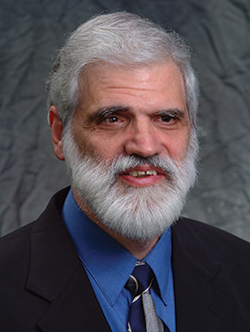You will see the work of Richard Citta, ’71, on every TV
 Many UW engineering grads have made significant contributions to their field, but not all of their triumphs come into hundreds of millions of living rooms across the country like Richard Citta’s does.
Many UW engineering grads have made significant contributions to their field, but not all of their triumphs come into hundreds of millions of living rooms across the country like Richard Citta’s does.
Citta, ’71, and a team of Zenith Electronics Corp. engineers invented a delivery system that makes HDTV possible. For this achievement, the Institute of Electrical and Electronics Engineers honored him Jan. 10 with the 2006 Masaru lbuka Consumer Electronics Award, the tech industry’s highest honor.
Citta’s work was crucial to the patented transmission system that has made digital high-definition the gold standard in TV technology. The Federal Communications Commission will scrap TV’s 65-year-old analog system on Feb. 17, 2009. Consumers will need to buy an HDTV converter for their existing sets, subscribe to a cable or satellite service that will do the conversion for them, or buy a digital-ready TV. When they make the move, they will find that analog images pale in comparison to HDTV’s sharp, high-resolution pictures and Dolby Digital surround sound.
Holding more than 85 patents in the engineering field, Citta is the only two-time recipient of Zenith’s most prestigious award, the Robert Adler Technical Excellence Award. He is also a member of the Academy of Digital Television Pioneers, a group of more than 150 scientists, former government officials and media leaders who are working to bring digital television to the forefront of technological must-haves.
Although he is an HDTV pioneer, he is frank about its long-term prospects. “With today’s digital standards, things change a lot faster. I doubt HDTV will be around for more than 50 years like analog was,” he says.
When he was working on his master’s degree in electrical engineering at the UW in the late ’60s and early ’70s, digital television was strictly science fiction.
Despite Vietnam War protests swirling around him, Citta’s UW days were smooth sailing. He was a member of the canoe club and went white-water canoeing and mountain climbing regularly, in spite of the Seattle weather. “If it rained, we went canoeing,” he says. “If it was sunny, we went hiking. So, we mostly went canoeing.”
Today, 35 years after he left the UW, Citta is looking for the next breakthrough as chief scientist at Micronas Semiconductor Inc. in Palatine, Ill., an international supplier for consumer and automotive electronics.
For someone with drive and ambition, he says, there is no greater dream than becoming an inventor and technological pioneer. “If you like designing things and building them, it’s a good career,” Citta says.
But at the end of the day, he longs to escape from the world of high-tech. His favorite TV show— “M*A*S*H”—is 34 years old, and he admits that at home he is definitely low-tech. “At work I always use computers, but when I get home, I turn them all off.”